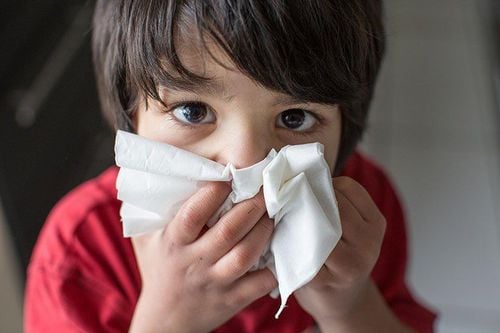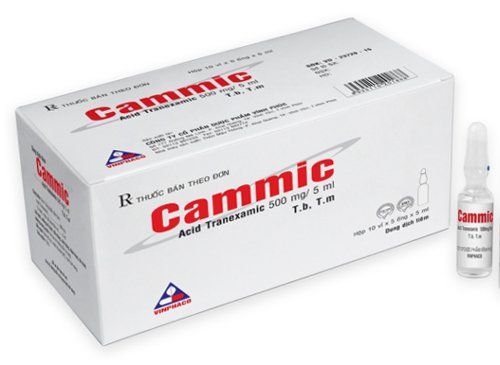This is an automatically translated article.
Nosebleeds during pregnancy are quite common, especially in the 4th month of pregnancy. About 2 out of every 10 pregnant women experience a nosebleed at least once during their pregnancy.
1. Nose bleed during pregnancy causes?
Nosebleed is a common condition in pregnant women, but it still confuses many mothers when they encounter it for the first time. This is mainly due to hormonal changes during pregnancy. Specifically, there is an increase in the hormones estrogen and progesterone during pregnancy, causing the amount of blood in the body to increase, to meet both the needs of the mother's body and the development of the fetus. Along with that, the blood vessels in the nose also dilate, blood circulates more than usual, the pressure on the vessel wall increases. When the limit is reached, blood vessels burst, causing nosebleeds during pregnancy.
In particular, the risk of nosebleeds during pregnancy increases if the pregnant mother has allergies, sinusitis, flu or cold weather, living in an air-conditioned environment, causing the mucous membranes in the nose to dry, crack and burst. High blood pressure, blood clotting disorders, or other trauma can also cause nosebleeds during pregnancy. Other known influencing factors are side effects of non-steroidal anti-inflammatory drugs, warfarin, aspirin, clopidogrel, enoxaparin, decongestants, antihistamines, nasal sprays,...
However Hormonal changes and other influencing factors do not cause pregnant women to have nosebleeds too often. Therefore, if your mother has frequent nosebleeds 2-3 times or often every week, you should see a doctor to check if you have a chronic disease.
2. Is nosebleed during pregnancy dangerous?
Although this condition is not uncommon, it is important to define nosebleeds during pregnancy as dangerous and to be careful. Because it is a warning sign that the pregnant mother may have postpartum hemorrhage. According to statistics, about 10% of women who have experienced nosebleeds during pregnancy also have postpartum hemorrhage, while this rate in the remaining group of pregnant women is only 6%.

Trắc nghiệm: Mẹ bầu nên làm gì khi bị thiếu ối?
Nước ối đóng vai trò quan trọng trong sự tồn tại và phát triển của thai nhi. Trường hợp lượng ối quá ít (thiểu ối) thì sẽ tiềm ẩn những nguy cơ như gây thiểu sản phổi, chèn ép dây rốn,... Trả lời các câu hỏi trắc nghiệm sau sẽ giúp bạn có những cách phòng ngừa và điều trị kịp thời.The following content is prepared under supervision of Thạc sĩ, Bác sĩ y khoa, Tạ Quốc Bản , Sản phụ khoa , Khoa Sản phụ khoa - Bệnh viện Đa khoa Quốc tế Vinmec Phú Quốc
3. First aid if you have a nosebleed while pregnant
This situation will be handled quickly if the pregnant mother knows how to give first aid effectively. First of all, when you have a nosebleed, you should sit down, cover the top of your nose, breathe only through your mouth. Holding like this for 10-15 minutes, leaning forward instead of back will help the blood pool to flow out of the nostrils, instead of back into the throat and stomach.
Many people think that not only pregnant women but also normal people with nosebleeds need to tilt their heads back to prevent bleeding. However, this method is not correct, because it does not stop the bleeding, but only causes the blood to flow back in. If there is a lot of blood, it will irritate the airways, very dangerous for pregnant women or children.
Normally, nosebleed lasts for about 20 minutes, if longer time passes, the bleeding still doesn't stop, go to the nearest medical facility for emergency treatment soon. If bleeding makes you dizzy, lie on your side.
When the bleeding has stopped, the mother should note that she should not lie on her back, lie on her side to rest or walk gently, avoid exercise or heavy labor. Monitor the condition, especially if you see frequent and prolonged nosebleeds, you should see a doctor soon to check the pathology.
4. What to do to prevent nosebleeds during pregnancy?
To prevent this situation, pregnant mothers should note that they should avoid hard labor, drink alcohol or stimulants, use drugs exactly as prescribed,... In addition, some foods should be added. Good for pregnancy as well as limit this nosebleed such as:
Foods containing vitamin K such as green onions, dark green leafy vegetables, garlic, cabbage, cucumbers, brussels sprouts,... help limit the condition. epistaxis. Foods containing iron such as: red meat, whole grains, seafood, ... prevent pregnant women with iron deficiency, nosebleeds or bruises due to anemia.

Foods containing vitamin C such as bell peppers, green leafy vegetables, berries, broccoli, citrus fruits, .. help prevent scurvy that causes bleeding. Potassium-rich foods such as tomatoes, avocados, bananas, etc. help prevent dehydration, regulate body fluids, and limit dryness and rupture of nasal blood vessels. In addition to these 4 important food groups, pregnant women need to pay attention to follow a balanced diet between foods and nutrition, eat and rest appropriately and healthily. Know the first aid steps if you have a nosebleed during pregnancy for quick and effective treatment if encountered.
At Vinmec International General Hospital, there is a package maternity service as a solution to help pregnant women feel secure because of the companionship of the medical team throughout the pregnancy. When choosing Maternity Package, pregnant women can:
The pregnancy process is monitored by a team of highly qualified doctors Regular check-ups, early detection of abnormalities The Package Maternity package helps to facilitate convenient for the birthing process Newborns get comprehensive care
Please dial HOTLINE for more information or register for an appointment HERE. Download MyVinmec app to make appointments faster and to manage your bookings easily.














